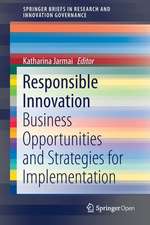Emotions and Risky Technologies: The International Library of Ethics, Law and Technology, cartea 5
Editat de Sabine Roeseren Limba Engleză Paperback – 5 sep 2012
| Toate formatele și edițiile | Preț | Express |
|---|---|---|
| Paperback (1) | 640.37 lei 6-8 săpt. | |
| SPRINGER NETHERLANDS – 5 sep 2012 | 640.37 lei 6-8 săpt. | |
| Hardback (1) | 646.62 lei 6-8 săpt. | |
| SPRINGER NETHERLANDS – 10 iun 2010 | 646.62 lei 6-8 săpt. |
Din seria The International Library of Ethics, Law and Technology
- 15%
 Preț: 700.75 lei
Preț: 700.75 lei - 20%
 Preț: 982.84 lei
Preț: 982.84 lei - 15%
 Preț: 642.83 lei
Preț: 642.83 lei - 15%
 Preț: 643.65 lei
Preț: 643.65 lei - 18%
 Preț: 832.11 lei
Preț: 832.11 lei -
 Preț: 374.37 lei
Preț: 374.37 lei - 15%
 Preț: 647.73 lei
Preț: 647.73 lei -
 Preț: 374.76 lei
Preț: 374.76 lei -
 Preț: 395.47 lei
Preț: 395.47 lei - 15%
 Preț: 586.23 lei
Preț: 586.23 lei - 15%
 Preț: 583.28 lei
Preț: 583.28 lei - 5%
 Preț: 1098.84 lei
Preț: 1098.84 lei - 15%
 Preț: 581.33 lei
Preț: 581.33 lei - 15%
 Preț: 589.14 lei
Preț: 589.14 lei - 15%
 Preț: 693.57 lei
Preț: 693.57 lei - 18%
 Preț: 725.43 lei
Preț: 725.43 lei - 15%
 Preț: 642.68 lei
Preț: 642.68 lei - 15%
 Preț: 640.37 lei
Preț: 640.37 lei -
 Preț: 288.27 lei
Preț: 288.27 lei - 24%
 Preț: 644.82 lei
Preț: 644.82 lei - 18%
 Preț: 736.94 lei
Preț: 736.94 lei - 15%
 Preț: 636.12 lei
Preț: 636.12 lei - 15%
 Preț: 638.24 lei
Preț: 638.24 lei - 5%
 Preț: 713.18 lei
Preț: 713.18 lei - 15%
 Preț: 637.78 lei
Preț: 637.78 lei
Preț: 640.37 lei
Preț vechi: 753.39 lei
-15% Nou
Puncte Express: 961
Preț estimativ în valută:
122.53€ • 127.93$ • 101.41£
122.53€ • 127.93$ • 101.41£
Carte tipărită la comandă
Livrare economică 05-19 aprilie
Preluare comenzi: 021 569.72.76
Specificații
ISBN-13: 9789400732360
ISBN-10: 9400732368
Pagini: 296
Ilustrații: XXXII, 262 p.
Dimensiuni: 155 x 235 x 16 mm
Greutate: 0.42 kg
Ediția:2010
Editura: SPRINGER NETHERLANDS
Colecția Springer
Seria The International Library of Ethics, Law and Technology
Locul publicării:Dordrecht, Netherlands
ISBN-10: 9400732368
Pagini: 296
Ilustrații: XXXII, 262 p.
Dimensiuni: 155 x 235 x 16 mm
Greutate: 0.42 kg
Ediția:2010
Editura: SPRINGER NETHERLANDS
Colecția Springer
Seria The International Library of Ethics, Law and Technology
Locul publicării:Dordrecht, Netherlands
Public țintă
ResearchCuprins
I: Emotions as Distortions about Risk.- Moral Heuristics and Risk.- Here’s How I Feel: Don’t Trust Your Feelings!.- If I Look at the Mass I Will Never Act: Psychic NumbingPsychic Numbing and GenocideGenocide .- Marketing Risk: Emotional Appeals Can Promote the Mindless Acceptance of Risk.- Emotions as Aids and Obstacles in Thinking About Risky Technologies.- II: Emotions and Virtues in Risk Assessment.- Risk Assessment as Virtue.- Emotions and Judgments About Risk.- The Moral Risks of Risky Technologies.- Ethical Imagination: Broadening Laboratory Deliberations.- III: Emotions as a Guide to Acceptable Risk.- Emotion in Risk Regulation: Competing Theories.- Emotions Within the Bounds of Pure Reason: Emotionality and Rationality in the Acceptance of Technological Risks.- Emotions Involved in Risk Perception: From Sociological and Psychological Risk Studies Towards a Neosentimentalist Meta-Ethics.- Risk Emotions and Risk Judgments: Passive Bodily Experience and Active Moral Reasoning in Judgmental Constellations.- Emotional Reflection About Risks.
Textul de pe ultima copertă
By offering an innovative and challenging approach to the topic of risk and emotion, this book covers completely new territory. It focuses on risk and emotion from the perspective of moral philosophy and emphasizes that emotions are an important source of moral knowledge. The book connects to important debates about risk and emotion in empirical decision theory. However, whereas in these debates, emotions are mainly seen as a threat for rational decision making, this book investigates the novel idea that emotions might be a normative guide in making judgments about morally acceptable risks.
Technological risks such as cloning, GM-foods, and nuclear energy spark heated and emotional debates. Many people are afraid of the possible unwanted consequences of such technologies. This gives rise to the following normative question: do we need emotions in order to be able to judge whether a technology and its concomitant risks are morally acceptable? This question has direct practical implications: should engineers, scientists and policy makers involved in developing risk regulation take emotions (of the public, but also their own) seriously or not?
This book sets the stage for research into moral emotions and risky technologies. It brings together leading scholars who work in the areas of risk perception, moral emotions, and ethics of risk, and lets them reflect on this exciting and important new topic. The book should be of interest for everybody involved with risk regulation, both at an academic and a practical level.
Technological risks such as cloning, GM-foods, and nuclear energy spark heated and emotional debates. Many people are afraid of the possible unwanted consequences of such technologies. This gives rise to the following normative question: do we need emotions in order to be able to judge whether a technology and its concomitant risks are morally acceptable? This question has direct practical implications: should engineers, scientists and policy makers involved in developing risk regulation take emotions (of the public, but also their own) seriously or not?
This book sets the stage for research into moral emotions and risky technologies. It brings together leading scholars who work in the areas of risk perception, moral emotions, and ethics of risk, and lets them reflect on this exciting and important new topic. The book should be of interest for everybody involved with risk regulation, both at an academic and a practical level.
Caracteristici
The first book to address the new topic of moral emotions about risky technologies Brings together empirical and normative-ethical viewpoints about risk and emotion Brings together leading scholars from philosophy and psychology who work on (moral) emotions and/or risk






















